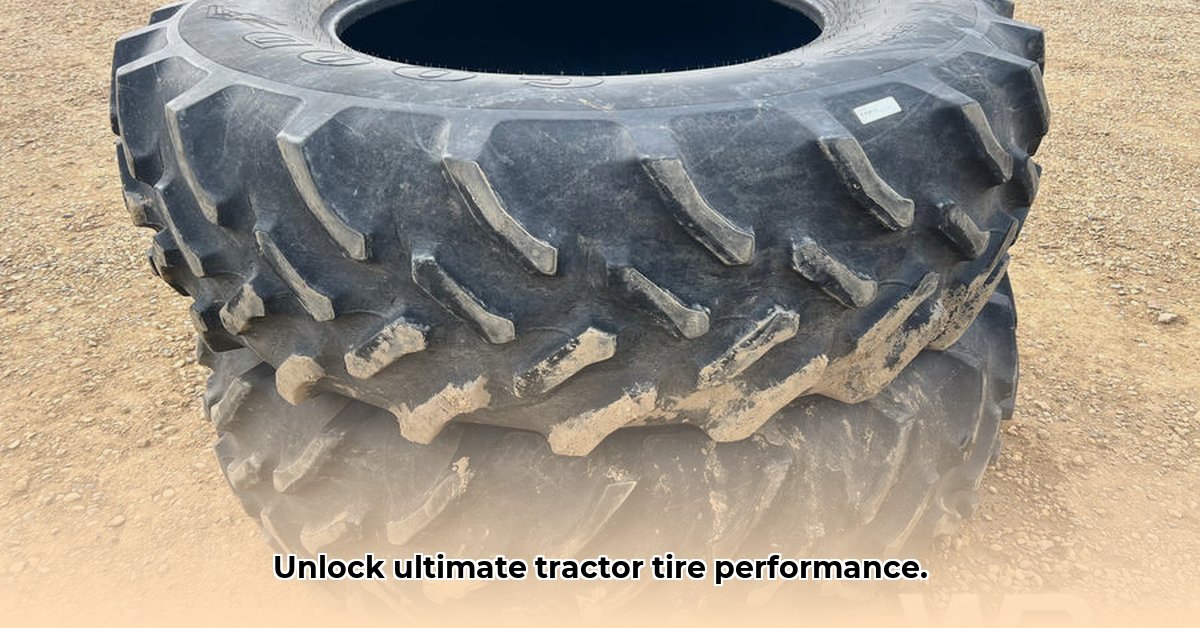
Understanding the 20.8 R38 Tractor Tire Market
The 20.8 R38 tire is a mainstay in large-scale agriculture, equipping many tractors across various farming operations. However, navigating the market for these tires presents a unique challenge: a surprising lack of readily available, consistent information regarding pricing, warranties, and especially, sustainability. Major suppliers like Petestirestore and Simple Tire 1 offer these tires, but comparing options requires significant effort due to inconsistent data presentation across different vendor websites. This guide aims to clarify the complexities, empowering informed decision-making for farmers, researchers, and industry professionals. For more tire size options, see this helpful resource: other tractor tire sizes.
Cost and Durability: A Cost-Per-Hour Analysis
When choosing 20.8 R38 tires, the initial price isn't the only factor to consider. A more holistic approach involves calculating the "cost-per-hour" of operation. This metric accounts for the tire's lifespan, maintenance, and eventual replacement. A slightly more expensive tire with superior durability might prove more cost-effective in the long run. Key durability indicators include:
- Tread Depth: Deeper treads generally equate to longer lifespan and better traction. Think of it as the tire's "grip."
- Load Capacity: Higher load capacity allows for heavier loads without compromising tire integrity or lifespan. Ensuring the right load capacity is critical for minimizing premature wear.
- Warranty: A robust warranty reflects the manufacturer's confidence in the product's quality and longevity, offering added assurance.
Sustainability: Minimizing the Environmental Footprint
The environmental impact of 20.8 R38 tires extends beyond their use; it encompasses their entire lifecycle: production, operation, and disposal.
- Manufacturing: Tire production is energy-intensive, consuming significant resources and generating emissions.
- Soil Compaction: Excessive soil compaction from heavy machinery reduces water infiltration, hinders root growth, and diminishes overall soil health—significantly impacting crop yields. It's like squeezing the life out of your soil.
- Disposal: Improper tire disposal contributes to landfill waste and potential environmental pollution.
Fortunately, sustainable practices can mitigate these impacts. These include:
- Low-Pressure Tires: These distribute weight more evenly, reducing soil compaction. It's like using wider shoes to distribute your weight on soft surfaces.
- Precision Farming: GPS-guided machinery and variable-rate technology minimize overlapping passes, reducing compaction and fuel consumption.
- Sustainable Materials: Research into bio-based polymers and recycled materials promises more environmentally friendly tire construction in the future.
- Tire Recycling Programs: Supporting tire recycling initiatives helps divert waste from landfills and encourages a circular economy.
Government regulations are also increasingly focused on promoting environmentally responsible agricultural practices, further emphasizing the importance of sustainable tire choices.
Buying Guide: A Step-by-Step Selection Process
Choosing the right 20.8 R38 tires involves a systematic approach:
- Budget: Determine your total investment, accounting for purchase price, maintenance, and replacements. Consider the cost-per-hour analysis discussed earlier.
- Soil Conditions: Different soil types (sandy, clay, loam) demand tires with varying characteristics to optimize traction and minimize compaction. Clay soils require different considerations than sandy loam.
- Operational Requirements: The number of annual operating hours and the terrain type significantly influence tire selection. Intensive use demands more durable tires.
- Tire Specifications: Carefully check load capacity, pressure ratings, and tread depth to ensure they align with your tractor's specifications and intended use. Never overload your tires.
- Sustainability: Prioritize tires made of sustainable materials or those with readily available recycling options. Consider factors across the entire lifecycle.
Future Outlook: Technological Advancements and Sustainability
The agricultural tire industry is actively pursuing innovation in materials and design. Future advancements promise improved fuel efficiency, longer-lasting tires, and reduced environmental impact. This includes the exploring of bio-based materials and advanced tread patterns. Continued research and development are crucial to realizing these advancements. Moreover, impending regulations will undoubtedly further push the sector towards greater sustainability.
Conclusion: Balancing Economics and Environmental Responsibility
Selecting 20.8 R38 tractor tires requires a balanced approach—weighing both economic and environmental considerations. By understanding the cost-per-hour of operation, considering the crucial role of these tires in soil health, and embracing sustainable practices, farmers can make informed decisions that benefit their operations and the environment. Choosing tires is about more than just the initial cost; it's about long-term sustainability and responsible farming.